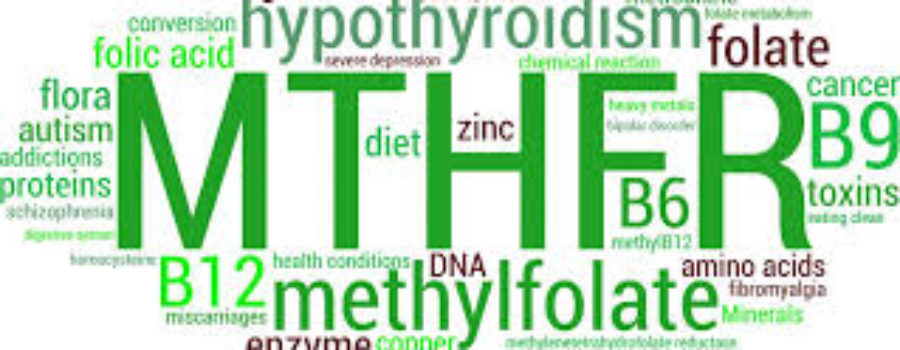Methylation & Detoxification
Why is it important?
The methylation cycle helps us to operate both physically and mentally, so it may not be surprising that many different functions in the body use this process. Such functions include nervous, cardiovascular and immune system activity, as well as energy production, heavy-metal detoxification and hormone balance.
So, methylation is a chemical reaction that occurs in every cell and tissue in your body. Enzymes, hormones, and even genes are proteins and the process of methylation affects them all.

As we grow older, methylation begins to drift.
The body’s methylation process is key to maintaining a healthy level of homocysteine, as well as to multiple other biochemical processes involving neurotransmitters, detoxification, cardiovascular health, eye health, muscle health and bone health.
Eating a rainbow of fruits and vegetables and lots of leafy green will promotes healthy methylation, it helps maintain heart, blood vessel, cognitive, nerve, bone, and female reproductive health. Food high in folate, vitamin B9 are asparagus, avocado, broccoli, brussels sprouts, beans, peas, lentils, legumes, leafy green vegetables and whole foods not processed foods.

Detoxification
In some instances, methylation of proteins helps the body detoxify. For example, the methylation process helps convert the toxic amino acid (homocysteine) into a beneficial amino acid methionine. If your body cannot methylate properly, toxins build up in your bloodstream and will eventually cause disease.
Homocysteine is a common amino acid in your blood, and it is toxic and if high levels remain in the body this can cause many health issues. You get it mostly from eating meat. High levels of it are linked to early development of heart disease. In fact, a high level of homocysteine is a risk factor for heart disease. It’s associated with low levels of vitamins B6, B12, and folate, as well as renal disease. Maintaining a normal homocysteine level in the blood has joined having normal cholesterol and triglyceride levels as primary objectives for maintaining good cardiovascular health.

Methionine is an amino acid. Amino acids are the building blocks that our bodies use to make proteins It’s plays an important role in the many functions within the body. Foods high in methionine are brazil nuts, cashews, black beans, edamame, organic tofu, seaweed, kelp noodles, spinach, broccoli including the leaves, turnips and the leaves, mushrooms, asparagus, kidney beans, avocado, palm hearts, cauliflower, chives, parsley, horseradish, lettuce, bamboo shoots, cucumber, peas and beans.

Intermittent Fasting 12:12 or 16:8 can help methylation and may have an impact on treating or preventing age-related diseases such as heart disease, cancer, Alzheimer’s, and diabetes. You eat all your meals within an eight-hour clump during the day and abstain from eating for the other 16 hours. A research usually fasting diet reduce body weight and body fat and also decreased the body’s production of the IGF-1 hormone, which has been implicated in cell processes that lead to ageing and disease. The study showed a decrease in C-reactive protein — that’s notable because it is a marker for inflammation, which in recent years has been implicated in a range of diseases, from heart disease, autoimmune to cancer.

One of the great benefits of intermittent fasting that I’ve written about often is that it promotes autophagy, the cellular self-cleaning process that breaks down and recycles damaged molecules and cells. By fasting intermittently, autophagy rates can be reset to that of a younger person. You must fast for at least 13 hours for autophagy to be effective.
Autophagy may help with slowing down aging of the skin but it’s not literally eating up wrinkles and loose skin. It only supports the processes that keep the skin more elastic and able to tighten up faster. When losing a large enough of weight autophagy may be helpful to tighten the skin.

Study shows following fasting mimicking diet or intermittent eating for three months, there were profound differences between visceral fat loss and lower blood sugar levels, markers of inflammation, blood cholesterol, and blood pressure.
Disruptions in methylation processes can cause a variety of issues, including:
- Heart Attack
- Stroke
- Dementia
- Depression
- Migraines
- Autism
- Fertility
- Cancer
- Birth defects
- many more
Methylation is fundamental to the proper function of almost all of the body’s systems. It’s involved in:
- Repairing and regenerating your cells, tissues and DNA
- Regulating gene expression and protein function
- Synthesizing neurotransmitters that influence mood, sleep, behaviour, cognition and memory
- Controlling homocysteine (an amino acid that can damage blood vessels)
- Keeping inflammation in check
- Assisting your liver in processing fats
- Activating and regulating the immune system
- Modifying toxins and heavy metals
Methylation is hugely important!
Methyl-folate is a key player in methylation, the process of adding a methyl group to a compound.
What is MTHFR and how is it related to methylation?
MTHFR (methyletetrahydrofolate reductase) is an enzyme that converts folate into a usable form that our bodies need. It is a key enzyme in an important detoxification reaction in the body – one that converts homocysteine (toxic) to methionine (benign).
If the enzyme is impaired, this detoxification reaction is impaired, leading to high homocysteine blood levels. Homocysteine is abrasive to blood vessels, essentially scratching them, leaving damage that causes heart attacks, stroke, dementia, and a host of other problems.
When methylation occurs, it has a significant positive impact on many biochemical reactions in the body that regulate the activity of the cardiovascular, neurological, reproductive, and detoxification systems, including those relating to:
- DNA production
- Neurotransmitter Production
- Detoxification
- Histamine Metabolism
- Estrogen Metabolism
- Eye Health
- Fat Metabolism
- Cellular Energy
- Liver Health
Unfortunately, approximately 60% – 70% of people in the Australia (that is 1 in 1000) some can be a genetic mutation that makes it challenging for their bodies to create enough 5-MTHR.The active folate or methylfolate is also. called 5-MTHF.
Why do you need to care about methylation? Because it is so essential, and because of our busy lifestyles and nutrient-depleted foods, processed foods, drinking sugary beverages including alcohol. Some people may even have genetic differences, polymorphisms that reduce their ability to methylate quite significantly. How would you know if you need methylation support more than someone else?
The most common signs:
1. Hormonal imbalances: PCOS, PMS, fibroids, endometriosis etc.
Methylation is important for metabolising and detoxifying oestrogen, and so if it is a little slow, it can lead to the symptoms above. Also, if your periods are excessively heavy, you may need more iron, folate and B12 to build new blood. Foods rich in folate will be highly beneficial for your body.
2. Infertility (both male and female), history of miscarriage or pregnancy related complications e.g. pre-eclampsia
Methylation is absolutely crucial to the growth of new tissue, so it is vital for fertility, maintaining a healthy pregnancy and supporting foetal growth. Your need for nutrients, (folic acid from folate in particular) increases exponentially during pregnancy. In addition, if you have experienced any of the problems above, your requirements may be even higher in comparison to a person who hasn’t, therefore diet alone may not be enough.
3. Cardiovascular disease, high blood pressure, poor circulation
If you’re not methylating properly, you may end up with high levels of homocysteine. Excess homocysteine can lead to inflammation and free radical damage, especially in your blood vessels.
4. Mood and mental health issues: mood swings, depression, anxiety, bipolar, OCD etc.
Methylation is needed for the production and metabolism of several key mood-modulating neurotransmitters; dopamine, serotonin, noradrenalin, adrenalin. Therefore, if disrupted, it can lead to either low, high, or fluctuating levels, having a negative effect on our mood and stress resilience.
5. Autoimmune conditions: e.g. multiple sclerosis, rheumatoid arthritis, autoimmune thyroid
Methylation is key to immune regulation and repair. Many studies link high homocysteine and genetic factors affecting methylation, to autoimmune conditions in general.
6. Memory problems, insomnia, dementia, Alzheimer’s disease
Just like high homocysteine can be damaging to our blood vessels, it can have the same effect in the brain by damaging our neurons and causing inflammation. Multiple studies have linked poor methylation to cognitive problems. In order to sleep, we need to produce the sleep hormone – melatonin, from serotonin, and guess what, this process also happens through methylation!
7. Chronic fatigue, ME, low energy
Energy production, healthy thyroid, adrenal and nervous function are all dependant on methylation and a good supply of vitamin B12, B6, folate, zinc and magnesium all of which get the methylation cycle going. Eat whole foods, a rainbow of fruits and vegetables as these may add rich nutrients of folate, zinc and magnesium into your body.
8. Allergies and histamine intolerance: eczema, hay fever, headaches, congestion, hives etc.
Allergies are characterised by an increased production of histamine – a chemical that causes all of the symptoms we associated with allergies: sneezing, itching, runny nose or watery eyes. Excess histamine in the cells is cleared by adding a ‘methyl group’ to it. This makes it inactive and ready to be excreted.
9. Poor bile production leading to digestive problems, fat malabsorption, and gallbladder issues like gall stones etc.
Bile is a thick, yellow-green fluid produced by your liver and stored in the gallbladder. It plays a few vital roles. When secreted into the intestines, it has anti-microbial properties, cleansing the bowel and preventing overgrowth of unwelcome bacteria/yeast. It also aids absorption of fats and fat-soluble nutrients (vitamin A, D, E & K), and helps your body excrete toxins and excess cholesterol. You can see how vital it is to our health! However, if your methylation is disrupted, you may not produce enough phosphatidylcholine – a key component of bile.
10. You have an inflammatory condition e.g. arthritis inflammatory bowel disease (IBD)
Constant inflammation is a big strain on the body in general and it can drain your ‘methyl pool’ – the availability of methylated molecules in the body that are ready to be donated to various essential processes. If that pool is continuously ‘drained’ by inflammation, other essential processes, such as tissue repair or neurotransmitter production can be affected. If you have a chronic digestive disorder such as IBD or pernicious anaemia, your absorption of vital nutrients, such as vitamin B12, may also be significantly reduced.
Methylation Imbalance Conditions and Symptoms

Bipolar disorder, behaviour and learning disorders – ADHD/ADD, autism, schizophrenia, Alzheimer’s disease, Parkinson’s disease, autoimmune diseases, cancer, depression, high anxiety, obsessive-compulsive disorder, perfectionism, panic disorder, addictions, PMS, chemical and food sensitivities, amenorrhea (absence of menstruation), infertility, hair loss, anemia, elevated blood sugar, high blood pressure, memory loss, violent behaviour, hypothyroidism, skin rashes, headaches, insomnia, tinnitus (ringing in the ears), sensitive skin, spaciness, racing thoughts, arthritis, asthma, allergies, weight gain, weight loss, and chronic infections.
When Methylation switch is turned off, then a number of important molecules cannot be efficiently produced, including:
- Glutathione –is a powerful antioxidant that has gained a lot of attention for its purported health benefits. … Some people swear by its anti-aging properties, while others say that it can treat autism, increase fat metabolism, and even prevent cancer.
- Coenzyme Q10 – antioxidant help improve heart health and blood sugar regulation, assist in the prevention and treatment of cancer and reduce the frequency of migraines. It could also reduce the oxidative damage that leads to muscle fatigue, skin damage and brain and lung diseases.
- Melatonin – is a hormone made by the pineal gland. That’s a pea-sized gland found just above the middle of your brain. It helps your body know when it’s time to sleep and wake up. Normally, your body makes more melatonin at night.
- Serotonin – mood regulation hormone, is made from the essential amino acid tryptophan.
- Nitric Oxide – compound in the body that causes blood vessels to widen and stimulates the release of certain hormones, such as insulin and human growth hormone
- Norepinephrine – stress response hormone, it works by constricting (narrowing) the blood vessels and increasing blood pressure and blood glucose (sugar) levels. Norepinephrine is used to treat life-threatening low blood pressure (hypotension) that can occur with certain medical conditions or surgical procedures.
- Epinephrine – stress response hormone, more commonly known as adrenaline, is a hormone secreted by the medulla of the adrenal glands. Strong emotions such as fear or anger cause epinephrine to be released into the bloodstream, which causes an increase in heart rate, muscle strength, blood pressure, and sugar metabolism.
- L-Carnitine – amino acid helps the body turn fat into energy.
- Cysteine – amino acid, is one of the few amino acids that contains sulphur. This allows cysteine to bond in a special way and maintain the structure of proteins in the body. Cysteine is a component of the antioxidant glutathione
- Taurine – is an amino acid that is important for your body and brain
IMPROVING THE METHYLATION CYCLE

In addition to a healthy, whole-food, non-processed food diet, make sure you are eating a lot of these foods:
- Asparagus
- Avocado
- Broccoli
- Brussels sprouts
- Green, leafy vegetables and fruit
- Legumes – peas, beans, lentils, black beans, lentils

Essential Nutrients for Methylation:
- Folate or Vitamin B9 – best in natural form of vegetables and fruit asparagus, avocado, broccoli, brussels sprouts, green leafy vegetables, legumes, and nuts.
- Vitamin B12 – Methylcobalamin – Vitamin B12 is a nutrient that helps keep the body’s nerve and blood cells healthy and helps make DNA, the genetic material in all cells. Vitamin B12 also helps prevent a type of anemia called megaloblastic anemia that makes people tired and weak. Found in nutritional yeast with fortified B12
- Vitamin B6 – is also needed for proper brain development (in kids) and function (for people of all ages). It helps the body make the hormones serotonin (which regulates mood) and norepinephrine (which helps your body cope with stress). Eat a rainbow of vegetables
- Riboflavin B2 – Green vegetables such as asparagus, broccoli, and spinach Deficiency B2 may also be brought on by poor absorption of folic acid in the intestine due to celiac disease, avoid gluten non-organic oats, barley, rye and wheat.
- Magnesium including Epsom salts bath – foods rich in magnesium – green leafy vegetables spinach, kale, broccoli, figs, avocado, banana and raspberries, nuts and seeds, legumes (black beans, chickpeas and kidney beans, peas, cabbage, green beans, artichokes, asparagus, brussels sprouts.
- Betaine – beetroot, wheat bran, rye grain, bulgar grain, spinach, quinoa, brown rice, sweet potato
- Vitamin D – early morning and afternoon sunshine. Add mushrooms into meals.

Lifestyle changes include:
- Engage in regular physical exercise
- Avoid excessive alcohol consumption
- Don’t smoke
- Avoid excessive coffee consumption (not more than five cups daily)
Proper methylation influences so many systems in our bodies that it often gets overlooked, which can severely impact how well your body functions.





